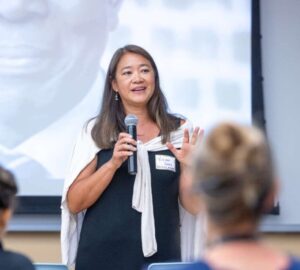Mushrooms Are Helping Moms Reclaim Their Power
Some mothers are turning to psilocybin mushrooms to navigate postpartum waves, shed outside expectations, and reconnect with themselves.
Your weekly dose of psychedelic insights and news
Why More Moms Are Doing Mushrooms—and Speaking Out About It
These mothers are reclaiming their power, one psilocybin mushroom at a time.
By Anja Jerkovic
I thought we all just pretended to make our way through it. Motherhood is like a speed course on meditation, except for the fact that it isn’t really meditation at all. It’s more like a zapping of one’s attention to this new little being you are sharing the rest of your life with. Joy and worry are simultaneously present. The old you who wasn’t constantly mom-ing? Gone. Out the window. That’s what it felt like when I gave birth to my daughter eight months ago, as if everything outside our little realm was running in fast-forward mode and we were on the turtle track, adjusting to our new normal.
🍃 DoubleBlind’s Cannabis Ceremony + Psychedelic
Workshop is this Sunday—join us!
The sudden shift in everything gradually settled. The fear of postpartum loomed. I felt good, but overwhelmed, and I wondered how moms did it, this thing, parenting, but still being a human. A friend of mine mentioned that her sister, the mother of a 6-year-old and 14-month-old, was working through her own postpartum wave by microdosing magic mushrooms. She said she was sure she’d be willing to talk about it.
“They reawakened what was stagnant in me. It felt like they were saying, “Do you remember? Here’s the gateway,” said Dawn, who asked to only be identified by her first name.
Google led me to more women who shared that experience of mushrooms helping them feel, as Dawn put it, “whole again,” and accept their transition into motherhood. There, through scrolling articles and organizations that proved mothers advocating for psilocybin’s medicinal properties was a thing, a world opened up. Mothers, activists, and educators. It was a world in which mothers were driven to be better to themselves and, as a result, the environment around them.
By incorporating psilocybin mushrooms into their daily or weekly or monthly routines, they were able to work through the confusion, fear, and anxiousness that often coincide with becoming and being a mother. As Sunny Jackson, an entheogenic facilitator and co-creator of the organizations, Healing Hustlas and Village of Mothers told me, the mushrooms are helping mothers get clear about their own needs and trust their own instincts by lowering the volume of outside expectations and letting their internal voices speak.
“When you work with psilocybin, you’re able to hear yourself clearly,” Jackson said. “Psilocybin is the medicine that is the heart opener. It becomes interwoven into everything you do.”
Continue reading after our partner message below.
Together With Confluence Retreats
Discover the questions most people forget to ask.
You’ve researched retreat centers, compared prices, and read testimonials. But before you book, there’s one step that can make or break your experience—and it’s already available to you.
Most reputable psilocybin retreats offer a pre-retreat consultation call. The problem? Many people don’t know which questions actually reveal red flags—or green ones.
This is often your only chance to sense whether a center truly understands your needs, concerns, and intentions—before committing your time, money, and psychological well-being.
How do they respond when you share what you’re hoping to work through? Do they ask thoughtful questions about your mental health or medications? Can they explain their approach in a grounded way—neither overly mystical nor clinically detached? Do they simply tell you what to expect, or help you unpack your intentions in a way that begins building trust?
The 2025 Legal Psilocybin Journey Guide gives you the essential questions to ask during these calls—and what their responses reveal about finding your best match.
There’s a lot out there we’re constantly being told to do—breastfeed, skin to skin, stretch, eat healthy, be outside, be patient, caring, attentive. It’s hard to make peace with the fact that we’re not always doing these things. That expectation makes it hard for mothers to accept ourselves as we are, which is essentially, imperfect. Magic mushrooms helped these women trust that they know what’s best for themselves. It’s in exact contrast to the idea of mothers as passive and obedient caretakers, waiting for input from the outside world as to what makes a good mom.
Mikaela de la Myco, a womb care and plant medicine educator known as “Mama de la Myco,” uses the term “matriarchs” to describe mothers who are finding their way back to doing the things that they love, addressing wounds that affected their ability to parent from a place of confidence, and tuning into a greater consciousness.
I suppose I’d expected it to be more underground, more anonymous, considering psilocybin’s status as an illegal substance in most countries around the world. My judgment around my own use of plant medicine allowed me to assume everyone else hid their taboo helpers, too. But on the contrary, these moms wanted to talk about magic mushrooms. Hearing about how their experiences improved the quality of their lives shifted something in me—a desire to accept that mothers are allowed to live a life in which they are not merely checking the boxes of what is expected of them, but rather, leading by following their own directives.
And that’s what magic mushrooms seem to be doing: helping them feel within a role that involves so much thinking. “Mushrooms allow mothers, and specifically BIPOC moms, to come out of survival mode and include self-care as a basis for good parenting. We’re setting moms up as being the priority for once,” Jackson told me. “And when we pour into moms,” de la Myco added, “we pour into the next generation.”
These moms describe a world in which moms are actively working for their well-being by recognizing what fears are holding them back, why they lack confidence, and what their voice sounds like. With the help of tools like writing, dancing, and gathering in community, they have been able to integrate the messages they received during their work with psilocybin. They shared healing in areas such as alcoholism, connecting with children on the autism spectrum, preparing for birth, and showing up for their children in a more loving, attentive way. Moms serving themselves. Because, in general, de la Myco expressed, society doesn’t serve moms. In contrast, it actually expects a lot (from moms) and doesn’t give back. As a result, mothers have trouble trusting their own intuitive instructions on how to best show up for their children.
She alluded to the mom tropes of our time–wine moms, moms on antidepressants, helicopter moms–categorizations pinning us in one big cluster as over-exhausted, unhappy, and selfless. De la Myco agreed that “microdosing moms,” a description used to refer to mothers engaged with psilocybin, is on the edge of that, comfortably fitting into the script of being a pharmacological agent as opposed to “a consciousness that we merge with and that teaches us what augments our consciousness. Society is still more comfortable with the picture of a family mom popping a few pills whilst still able to fulfill all her duties than a matriarch serving herself and her community.”
Her sentiment touches on society’s resistance to acknowledging the healing properties of magic mushrooms and the way they’ve been used within Indigenous cultures for centuries. De la Myco expressed to me that during her fourth month of pregnancy, an elder in her community gave her the permission she needed to follow through on the calling she felt to “journey” with psilocybin.
“There’s still a major lack of info and lack of science, but at the same time, a total assuredness of what is right,” de la Myco says. “ It discredits 1000 years of cultural knowledge.”
Psilocybin’s illegal status keeps conversations like these taboo in public forums. The women coming forward with their stories take the risk of being shoved into another trope. But these moms aren’t escape artists—they’re diving into their pain, their resistance, and lifting the veil to see what’s at the core. Some are viewing themselves, as Jackson said, as “advocates.” “I have no doubt that this is the best thing for me and my child,” Dawn expressed.
I didn’t need proof for that. In their circles, women were cultivating mushrooms, running businesses, healing from postpartum depression, connecting more deeply with their partners, and feeling happy, not overwhelmed, to be a mother. They’re holding space in their communities for mothers to be full, complex beings, not hyper-pure as society would like us to be, but as de la Myco puts it, light and dark beings, whole, and deserving of living a life not based on the expectations of the world around them. They’re helping themselves clear mothering insecurities and come to a place of being able to say: “I know what I’m doing. I’m good at this,” Jackson said.
Having these conversations made me hopeful about the possibility of a world where mothers decide what works for them and what doesn’t. How? By tuning into the stories of mothers who trust themselves enough to do what feels right for them. Maybe then, knowledge which is derived from feeling, supported by plant medicine, will cease to be judged from a place of right or wrong, but rather, accepted as an individual truth. In doing so, perhaps we’ll come closer to living the answer to a question de la Myco posed to me as we finished our discussion:
What would a world where mothers are actually supported look like?
Together With Confluence Retreats
Most psilocybin retreat centers offer consultation calls, but do you know what to listen for?
This conversation reveals whether they truly understand your needs and concerns. How they respond to your mental health history, intentions, and questions shows you their real approach—grounded, mystical, or clinically detached.
How was today’s Dispatch?
Login or Subscribe to participate in polls.
💌 If you loved this email, forward it to a psychonaut in your life.
Editorial Process
DoubleBlind is a trusted resource for news, evidence-based education, and reporting on psychedelics. We work with leading medical professionals, scientific researchers, journalists, mycologists, indigenous stewards, and cultural pioneers. Read about our editorial policy and fact-checking process here.
DoubleBlind Mag Read More




